Copyright A. R. Ammons 1996
All rights reserved
Published in the United States of America by
The University of Michigan Press
Manufactured in the United States of America
 Printed on acid-free paper
Printed on acid-free paper
2009 2008 2007 2006 6 5 4 3
No part of this publication may be reproduced, stored in a retrieval system, or transmitted in any form or by any means, electronic, mechanical, or otherwise, without the written permission of the publisher.
A CIP catalog record for this book is available from the British Library.
Library of Congress Cataloging-in-Publication Data
Ammons, A. R., 1926
Set in motion : essays, interviews, and dialogues / A. R. Ammons; edited by Zofia Burr.
p. cm. (Poets on poetry)
ISBN 0-472-09603-6 (alk. paper).
ISBN 0-472-06603-X (pbk. : alk. paper) ISBN 978-0-472-06603-2
I. Ammons, A. R., 1926......Interviews. 2. Poets, American 20th centuryInterviews. 3. Poetics. I. Burr, Zofia.
II. Title. III. Series.
PS350I.M67.475 1996
811.54dc20
96-30225
CIP
ISBN-13 978-0-472-02238-0 (electronic)
Contents
A. R. Ammons
Set in Motion
ESSAYS, INTERVIEWS,
AND DIALOGUES
Edited by Zofia Burr
Ann Arbor
THE UNIVERSITY OF MICHIGAN PRESS
Set in Motion
POETS ON POETRY
David Lehman, General Editor
Donald Hall, Founding Editor
New titles
John Ashbery, Selected Prose
Annie Finch, The Body of Poetry
Dana Gioia, Barrier of a Common Language
Paul Hoover, Fables of Representation
Philip Larkin, Further Requirements
Alice Notley, Coming After
Charles Simic, Memory Piano
William Stafford, The Answers Are Inside the Mountains
Richard Tillinghast, Poetry and What Is Real
Recently published
Thomas M. Disch, The Castle of Perseverance
Mark Jarman, Body and Soul
Philip Levine, So Ask
David Mura, Song for Uncle Tom, Tonto, and Mr. Moto
Karl Shapiro, Essay on Rime
Charles Simic, The Metaphysician in the Dark
Stephen Yenser, A Boundless Field
Also available are collections by
A. R. Ammons, Robert Bly, Philip Booth, Marianne Boruch,
Hayden Carruth, Amy Clampitt, Douglas Crase, Robert Creeley,
Donald Davie, Tess Gallagher, Linda Gregerson, Allen Grossman,
Thorn Gunn, Rachel Hadas, John Haines, Donald Hall, Joy Harjo,
Robert Hayden, Edward Hirsch, Daniel Hoffman, Jonathan Holden,
John Hollander, Andrew Hudgins, Josephine Jacobsen,
Galway Kinnell, Kenneth Koch, John Koethe, Yusef Komunyakaa,
Maxine Kumin, Martin Lammon (editor), Philip Larkin,
David Lehman, Philip Levine, Larry Levis, John Logan, William Logan,
William Matthews, William Meredith, Jane Miller, Carol Muske,
Geoffrey OBrien, Gregory Orr, Alicia Suskin Ostriker, Ron Padgett,
Marge Piercy, Anne Sexton, Charles Simic, William Stafford,
Anne Stevenson, May Swenson, James Tate, Richard Tillinghast,
C. K. Williams, Alan Williamson, Charles Wright, and James Wright
Acknowledgments
I am much obliged to Zofia Burr who brought up the idea of this book, gathered the materials for it, and contributed some of the materials herself. She lent the sustaining spirit for its completion, and her perspicuity and judgment have contributed largely to whatever force the collection has as a whole.
David Lehman has also generously contributed to the text and has brilliantly devised the materials into clarifying parts. I am grateful to him for his warm endorsement of the whole project, as well as for the many late stages of polishing and rearranging he worked through.
Grateful acknowledgment is made to the editors and publishers of the following books, magazines, and newspapers, in which parts of this book originally appeared, sometimes in a different form: Diacritics; Ommateum with Doxology; Poetry; Epoch; Chelsea; American Poetry Review; Journeywork; North Carolinas 400 Years: Signs Along the Way; Pembroke Magazine; The Best American Poetry 1994; New York Times Book Review; Michigan Quarterly Review; Speak, So I Shall Know Thee: Interviews with Southern Writers; Ecstatic Occasions, Expedient Forms; The Best American Poetry 1988; The Best American Poetry 1989; The Best American Poetry 1990; The Best American Poetry 1993; The Hudson Review; and The Yale Review. Complete citations and publication histories are given on the first page of each piece. Copyright is held by A. R. Ammons. Reprinted with permission of the author. All rights reserved.
Editors Introduction
Since 1955 A. R. Ammons has written over twenty books of poetry. His work has been honored by two National Book Awards, a Guggenheim Fellowship, an American Academy of Arts and Letters Traveling Fellowship, the Levinson Prize, the National Book Critics Circle Award, the Bollingen Prize, an award from the National Institute of Arts and Letters, a MacArthur Prize, and a Lannan Foundation Award. Despite his contribution to contemporary poetry and the public recognition that has been accorded it, Ammons has maintained a certain reticence when it comes to discussing his work. The comments he has made have been scattered across a range of publications and over a long period of time, so that it has been difficult to gather a detailed sense of his own perspective on his works and vocation.
When I suggested that we collect and publish a selection of his prose, Archie was not in favor of the project. The proliferation of prose by poets only seemed to sharpen what he saw as a turning away from the honest complexity of poetic action toward the reductive simplicity of proposition. Only when Ammons saw that the collection could be shaped to articulate the usefulness of poetry to our contemporary situation did he agree to proceed with the project. This book was designed, then, to engage with those who continue to make and read poetry as well as with those inclined to believe that poetry is of no use to us now.
The pieces collected here comprise an attempt to illuminate the work of poetry in the contemporary world by way of an extended discussion of Ammonss poetics in particular. The volume has three sections: Notes, Interviews, and Poems and Comment. The first section consists of short pieces composed between 1955 and 1994. Despite the variety of analogies that Ammons employs to characterize and clarify the work of poetry and despite the sheer span of time that these remarks cover, what is striking is the consistency with which he has formulated his poetics. The second section, four interviews, amplifies Ammonss view of poetry in discussions focused on his poetic process and career. Two of these interviews have not previously been published. The final section includes a selection of Ammonss poetry, along with his remarks on each poems particular inspiration and effects.
Ammons urges an engagement with poems that is genuinely exploratory. He challenges himself and otherswhether we are the poems maker or its readerto undertake the poem as a means of casting ahead into something we dont yet understand, rather than using the poem as a means of rediscovering what we think we already know. Because Ammons sees the poem, and the reading of poetry, as a model of


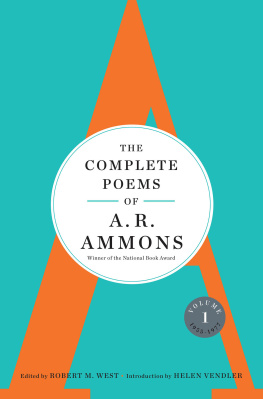
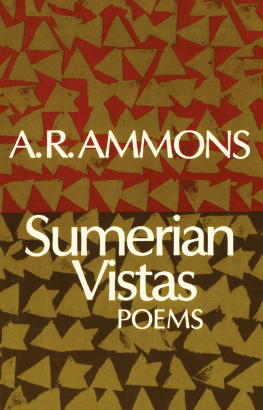
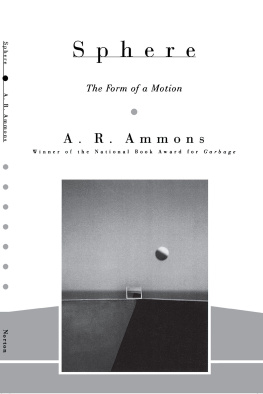
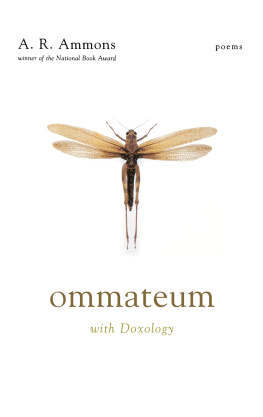
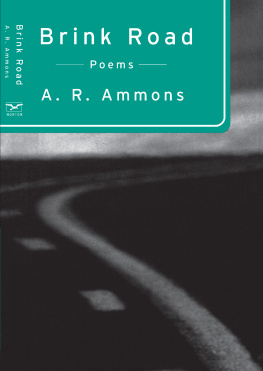
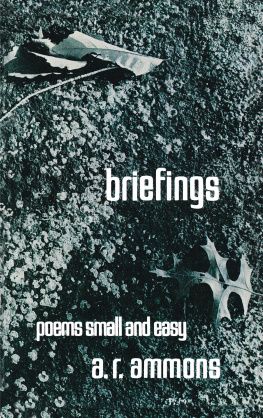
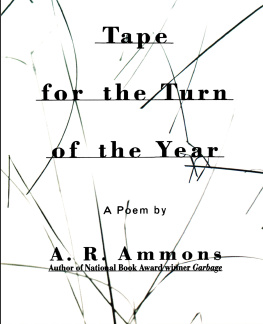
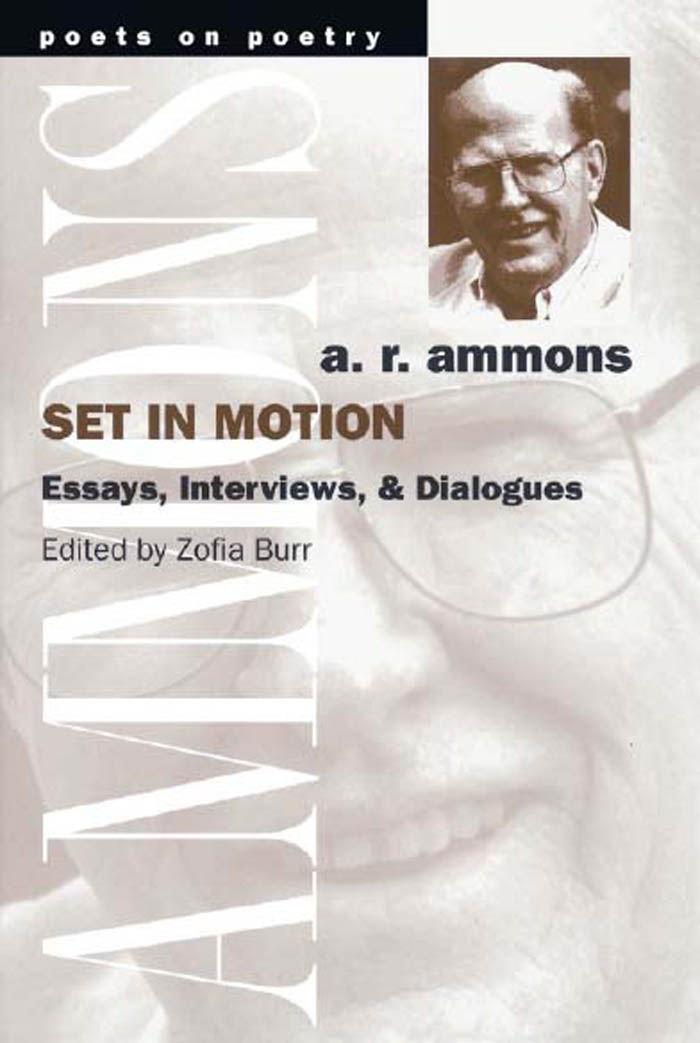
 Printed on acid-free paper
Printed on acid-free paper